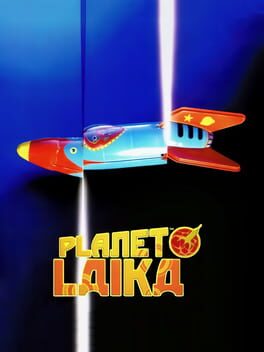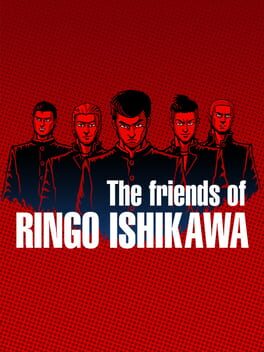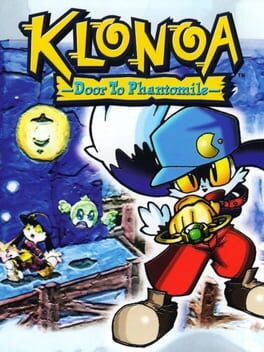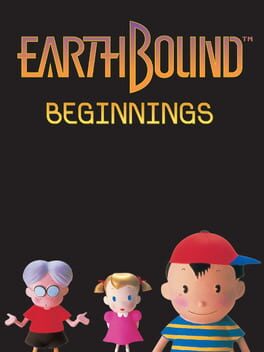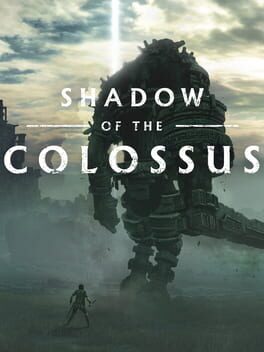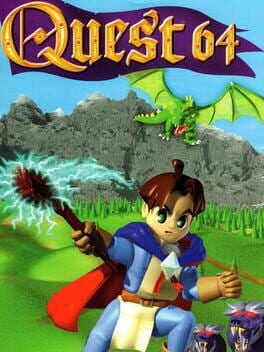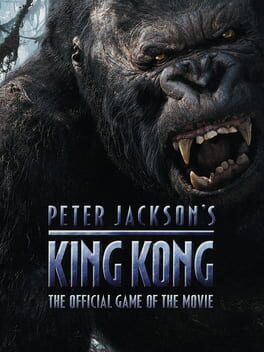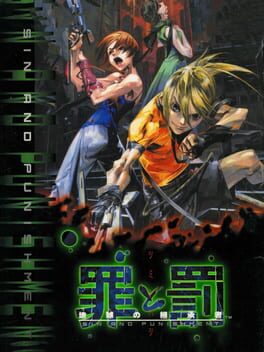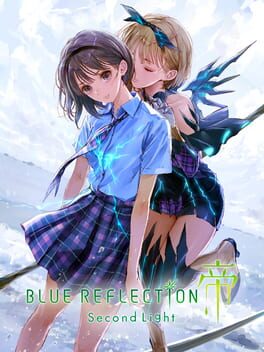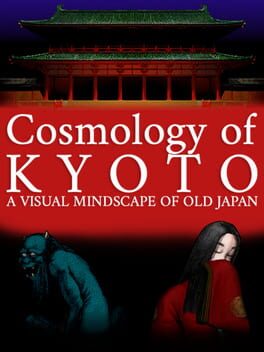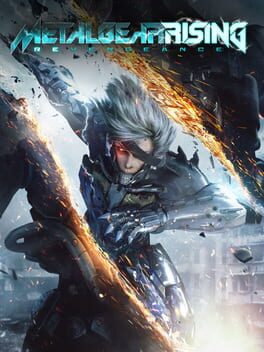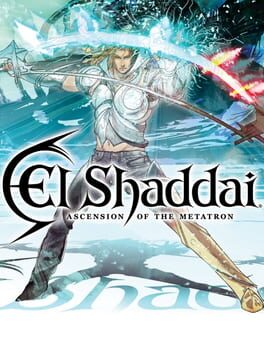ludzu
521 Reviews liked by ludzu
Planet Laika
1999
i will do untold amounts of crime to get this game a translation patch, it looks SO GROSS and CREEPY i want to love it so bad
Update: SOON... shoutouts to Cargodin and EsperKnight for making me not have to learn japanese
Update: https://www.romhacking.net/translations/6451/ gooped off my gourd with happiness. it real :)
Update: SOON... shoutouts to Cargodin and EsperKnight for making me not have to learn japanese
Update: https://www.romhacking.net/translations/6451/ gooped off my gourd with happiness. it real :)
Planet Laika
1999
An indie masterpiece I didn't click with.
Ringo Ishikawa is an intentionally directionless game. It provides a wide-open, beat-em up sandbox for you to explore. You have a plethora of choices available to you, different paths and minigames and stats to improve, different ways you can change the course of Ringo's life. But ultimately, those choices are so numerous they become... meaningless. Ringo still doesn't have a firm path that awaits him outside of high school. His friendships are still fracturing, all their prospects are grim, and its likely that they're about to enter some meaningless, dead-end lives.
The fact I didn't enjoy this game isn't the fault of the game itself. The game is designed to be melancholy and empty. That's a feature, not a bug. You have to find a joy in that feeling, that routine and aesthetic. Because this game is ALL aesthetic, full of secret ways to interact with the world. I fully believe its actually a perfectly crafted game, successful in everything its going for. I'm sure their follow-up game, Arrest of a Stone Buddha, is similarly brutal. Its just not something I could make myself devote a full playthrough towards.
I googled the ending and just. Goddamn. Gutting. Fuck, man.
Ringo Ishikawa is an intentionally directionless game. It provides a wide-open, beat-em up sandbox for you to explore. You have a plethora of choices available to you, different paths and minigames and stats to improve, different ways you can change the course of Ringo's life. But ultimately, those choices are so numerous they become... meaningless. Ringo still doesn't have a firm path that awaits him outside of high school. His friendships are still fracturing, all their prospects are grim, and its likely that they're about to enter some meaningless, dead-end lives.
The fact I didn't enjoy this game isn't the fault of the game itself. The game is designed to be melancholy and empty. That's a feature, not a bug. You have to find a joy in that feeling, that routine and aesthetic. Because this game is ALL aesthetic, full of secret ways to interact with the world. I fully believe its actually a perfectly crafted game, successful in everything its going for. I'm sure their follow-up game, Arrest of a Stone Buddha, is similarly brutal. Its just not something I could make myself devote a full playthrough towards.
I googled the ending and just. Goddamn. Gutting. Fuck, man.
This review contains spoilers
I'll preface this by noting how odd I find it that many call this a Sonic clone - if anything, Klonoa is much more similar to the Kirby series, or even Yoshi. He relies on enemies, their placement, and minor abilities to progress through the level in a slow and methodical manner. He's not very powerful on his own, perhaps even feeble. I think that's some odd talking point people have read somewhere before and parrot.
Gameplay wise, I forgot how open and nonlinear these levels are. You get a sense of each as a legible place - they feel holy, arcane, and well-used. Compared to Lunatea's Veil, which features mostly linear levels but a few more cinematic moments within them, Door to Phantomile toys with level design in a seamless way and feels genuinely inventive in how it structures its progression and difficulty. I respect a game that never gives you any new abilities; Klonoa truly does two things, but the game iterates on these so well, trickles new situations in with ease, and carefully disguises the fact that it's a puzzle platformer at heart.
Klonoa, in many ways, reminds me of Osamu Tezuka's "Unico" films. Unico is a unicorn so precious and preternaturally good the Gods became jealous, and cursed him to the Hill of Oblivion. The West Wind, who is tasked with sending him there, balks at the idea of doing something so cruel and instead deposits him somewhere remote on Earth where the Gods cannot find him. Because Unico is so kindhearted, though, he inevitably reveals himself by bringing happiness to those he meets, and The West Wind must whisk him away to somewhere else right as he finds happiness for himself.
Klonoa, similarly, exists as a flash of brilliance. He arrives, shines, and must leave. His playing an active role inevitably dooms him to unhappiness, to casting away his friends and memories so he can share his gift with the greater world.
Door to Phantomile is obviously analogous with childhood. Klonoa's life until now, however false it might be, exists as a dream. He lives with his benevolent grandfather and gets to spend every day with his best friend Huepow. His halcyon days are disquieted by the coming of a primordial nightmare.
In many ways, that nightmare, Ghadius, is right. A person cannot live in a idyllic dream forever. Those dark parts, the badness, will naturally seep in. And a child is best equipped to deal with this if they know what to expect, if they have people around them to support them and hoist them up. A child is weak and lost on its own, but truly blossoms when they confront these challenges head on.
Door to Phantomile is not only a game about killing the inner child, but one of preserving its corpse. Remembering what it was like to spread your legs for the first time, to smell the fresh air of youth. These memories may only be impressionistic - an image, a sound, a taste - and they may not even be real. But these memories are genetic imperatives, and they're what presses us to survive on.
If Door to Phantomile explores childhood, then Lunatea's Veil is adolescence; Klonoa must deal with the greys of life, the unsureness of purpose, the weight of the emotions around him. As a duology, nothing captures the tragedy of immaturity quite like Klonoa. They're proof that stories don't have to be complex to be essential; in fact, the simplest stories might be the ones that stay with us the most. For me, at least, the final frame of Door to Phantomile might be one of the most haunting of any game: After toiling against destiny to keep Klonoa with him, Huepow smiles as the dream fades, forgotten already. Despite this, Klonoa's resonance remains...
Also, Klonoa and Huepow are boyfriends. This is basically textual
Gameplay wise, I forgot how open and nonlinear these levels are. You get a sense of each as a legible place - they feel holy, arcane, and well-used. Compared to Lunatea's Veil, which features mostly linear levels but a few more cinematic moments within them, Door to Phantomile toys with level design in a seamless way and feels genuinely inventive in how it structures its progression and difficulty. I respect a game that never gives you any new abilities; Klonoa truly does two things, but the game iterates on these so well, trickles new situations in with ease, and carefully disguises the fact that it's a puzzle platformer at heart.
Klonoa, in many ways, reminds me of Osamu Tezuka's "Unico" films. Unico is a unicorn so precious and preternaturally good the Gods became jealous, and cursed him to the Hill of Oblivion. The West Wind, who is tasked with sending him there, balks at the idea of doing something so cruel and instead deposits him somewhere remote on Earth where the Gods cannot find him. Because Unico is so kindhearted, though, he inevitably reveals himself by bringing happiness to those he meets, and The West Wind must whisk him away to somewhere else right as he finds happiness for himself.
Klonoa, similarly, exists as a flash of brilliance. He arrives, shines, and must leave. His playing an active role inevitably dooms him to unhappiness, to casting away his friends and memories so he can share his gift with the greater world.
Door to Phantomile is obviously analogous with childhood. Klonoa's life until now, however false it might be, exists as a dream. He lives with his benevolent grandfather and gets to spend every day with his best friend Huepow. His halcyon days are disquieted by the coming of a primordial nightmare.
In many ways, that nightmare, Ghadius, is right. A person cannot live in a idyllic dream forever. Those dark parts, the badness, will naturally seep in. And a child is best equipped to deal with this if they know what to expect, if they have people around them to support them and hoist them up. A child is weak and lost on its own, but truly blossoms when they confront these challenges head on.
Door to Phantomile is not only a game about killing the inner child, but one of preserving its corpse. Remembering what it was like to spread your legs for the first time, to smell the fresh air of youth. These memories may only be impressionistic - an image, a sound, a taste - and they may not even be real. But these memories are genetic imperatives, and they're what presses us to survive on.
If Door to Phantomile explores childhood, then Lunatea's Veil is adolescence; Klonoa must deal with the greys of life, the unsureness of purpose, the weight of the emotions around him. As a duology, nothing captures the tragedy of immaturity quite like Klonoa. They're proof that stories don't have to be complex to be essential; in fact, the simplest stories might be the ones that stay with us the most. For me, at least, the final frame of Door to Phantomile might be one of the most haunting of any game: After toiling against destiny to keep Klonoa with him, Huepow smiles as the dream fades, forgotten already. Despite this, Klonoa's resonance remains...
Also, Klonoa and Huepow are boyfriends. This is basically textual
i was born exactly two weeks before 9/11 and about two months before the release of this game. my parents were journalists at the time, and i spent my childhood fairly frequently travelling between the uk and india. growing up, though i wasnt fully conscious of it, i was always somewhat aware of the gearing up of the surveillance state and at least once every year i would fully be subjected to the ultimate expression of post-9/11 surveillance - the airport security theatre, though of course it was more than theatre for us "global south" residents transiting to and fro "the west". i was also let on to the internet way too early and way too freely, so i was somewhat there for the last gasps of that particular brand of liberty, with all the good and bad that came with it, before we were all rounded up into walled gardens. i wouldnt say i am particularly nostalgic for that time, i dont think i ever truly understood it enough to miss it, my strongest associations with it are playing newgrounds games where sonic the hedgehog says fuck. but ultimately i mean to suggest that for me, it feels like i had always lived in a world where the patriots s3 plan had succeeded. so i cant really say that i can talk about the game's themes particularly comprehensively without doing a lot of research.
what i was a lot more interested in while playing this game for the first time in at least half a decade was to try to answer the question "what is metal gear solid 2: sons of liberty?" the box states that it is "a hideo kojima game", and that much is factual but what does that mean? textually, paratextually? structurally? my previous playthrough was on the vita rerelease, and this was my first time playing the original ps2 european release, so i was surprised when the game opened with a questionnaire ranging from "i have played mgs and im good at action games." to "never played mgs, bad at action games." it had been a while since i played mgs1, so expecting a story recap i chose "never played mgs, good at action games." upon which the game started me in big shell, playing as raiden, opening credits included and all. is "metal gear solid 2" exclusively the plant episode? is the tanker episode an epilogue of sorts to mgs1? what and why is the tanker episode, if the creators deem it only of interest to those who have played the previous game? do only those who have played the previous game expect to play as solid snake in "metal gear solid 2"? were those who have not played "metal gear solid" also not sold on the premise that "metal gear solid 2" is a game starring solid snake? does it not matter to them? is the tanker episode an appeasement of sorts then - those who have not played the previous game's trust can be broken easily and expect to be regained on the strength of the "true" "metal gear solid 2". but for those who had grown attached to snake and otacon, perhaps they had to have some promises fulfilled. that might be the textual/structural justification for tanker but there is also the consideration to be made that it is also the most graphically accomplished section in the game. the manhattan skyline at night, the rain pouring down endlessly, tarps fluttering in the air, all real time at 60 frames per second - its a sales pitch for the playstation 2. it is important that most paratextual material for this game prior to release, the trailers, the screenshots were all based on tanker, you cannot not buy a playstation 2 after that, could you? so from that perspective, tanker's inclusion has economic and industrial motivations beyond simply masquerading as a traditional sequel. it was simply a clever decision to incorporate a section with those motives into the game's narrative congenially. "metal gear solid 2: sons of liberty (tanker)" is a promise-fulfilling technical showpiece. "metal gear solid 2: sons of liberty (plant)" is a sometimes clumsy but prescient and subversive art piece. "metal gear solid 2: sons of liberty (tanker-plant)" is a now rare example of a work in this medium that commits to both its artistic intent and industrial expectations that i dont think even kojima has managed to achieve again.
what i was a lot more interested in while playing this game for the first time in at least half a decade was to try to answer the question "what is metal gear solid 2: sons of liberty?" the box states that it is "a hideo kojima game", and that much is factual but what does that mean? textually, paratextually? structurally? my previous playthrough was on the vita rerelease, and this was my first time playing the original ps2 european release, so i was surprised when the game opened with a questionnaire ranging from "i have played mgs and im good at action games." to "never played mgs, bad at action games." it had been a while since i played mgs1, so expecting a story recap i chose "never played mgs, good at action games." upon which the game started me in big shell, playing as raiden, opening credits included and all. is "metal gear solid 2" exclusively the plant episode? is the tanker episode an epilogue of sorts to mgs1? what and why is the tanker episode, if the creators deem it only of interest to those who have played the previous game? do only those who have played the previous game expect to play as solid snake in "metal gear solid 2"? were those who have not played "metal gear solid" also not sold on the premise that "metal gear solid 2" is a game starring solid snake? does it not matter to them? is the tanker episode an appeasement of sorts then - those who have not played the previous game's trust can be broken easily and expect to be regained on the strength of the "true" "metal gear solid 2". but for those who had grown attached to snake and otacon, perhaps they had to have some promises fulfilled. that might be the textual/structural justification for tanker but there is also the consideration to be made that it is also the most graphically accomplished section in the game. the manhattan skyline at night, the rain pouring down endlessly, tarps fluttering in the air, all real time at 60 frames per second - its a sales pitch for the playstation 2. it is important that most paratextual material for this game prior to release, the trailers, the screenshots were all based on tanker, you cannot not buy a playstation 2 after that, could you? so from that perspective, tanker's inclusion has economic and industrial motivations beyond simply masquerading as a traditional sequel. it was simply a clever decision to incorporate a section with those motives into the game's narrative congenially. "metal gear solid 2: sons of liberty (tanker)" is a promise-fulfilling technical showpiece. "metal gear solid 2: sons of liberty (plant)" is a sometimes clumsy but prescient and subversive art piece. "metal gear solid 2: sons of liberty (tanker-plant)" is a now rare example of a work in this medium that commits to both its artistic intent and industrial expectations that i dont think even kojima has managed to achieve again.
I have this distinct memory of running down the train tracks with Lloyd and Ninten in my party and thinking it felt exactly like something straight out of Stand By Me or a dozen other eighties coming-of-age films – and that's exactly what makes MOTHER so special to me. It perfectly captures the time period in which it was made and, more than its successors, truly feels like a childhood adventure much in the same way one might journey to the end of the road or go camping with their family.
My favorite MOTHER game. And yes – it's MOTHER. I refuse to call it EarthBound Beginnings.
My favorite MOTHER game. And yes – it's MOTHER. I refuse to call it EarthBound Beginnings.
This has single-handedly made me oppose all video game remakes on principle.
The original PS2 version, to this day, is stunning. The strengths and limitations of that console were utilized to create something completely unique and impossible to truly replicate (even pc emulation fails at this). The blinding bloom lighting, washed out colors, and low resolution gave the game this otherworldly sheen that I was mesmerized by. It gives the impression of a beautiful but god-forsaken no man's land enveloped by Dormin's light, a light without warmth.
The PS4 version just... Looks like a typical AAA PS4 game. It's technologically impressive, but that's the only thing there is to say about such boring, soulless visuals. And in a few years, you won't even be able to say that. The remake further disrupts the style of the original with meaningless new features for a purposefully minimalist game, like frivolous collectibles, a photo mode, and a stats page. All just to pad the game out with more time-wasting distractions, as if we didn't already have enough games packed with that.
Worse though are the subtle changes that most probably missed. The gut-wrenching wails of collosi have been replaced with generic monstrous roars (seriously, go to youtube and watch the 4th colossus fight in the original and then in the remake, it's a disgrace), and the enigmatic color changes of their eyes during battle have been removed altogether in favor of always-orange eyes to signify aggression without nuance.
The fact that this is seen by the vast majority of gamers as a faithful remake baffles me. Maybe because it lives up to how most remember it: The pretty looking game where you fight big monsters and it turns out you were the bad guy the whole time! That's pretty much what it is when you boil it down, but I always thought it had a bit more of a mystique that made it stand above most games.
There is no real appreciation in the industry for old games beyond surface level nostalgia, and I think that's one reason why video games are such a wasteland artistically.
The original PS2 version, to this day, is stunning. The strengths and limitations of that console were utilized to create something completely unique and impossible to truly replicate (even pc emulation fails at this). The blinding bloom lighting, washed out colors, and low resolution gave the game this otherworldly sheen that I was mesmerized by. It gives the impression of a beautiful but god-forsaken no man's land enveloped by Dormin's light, a light without warmth.
The PS4 version just... Looks like a typical AAA PS4 game. It's technologically impressive, but that's the only thing there is to say about such boring, soulless visuals. And in a few years, you won't even be able to say that. The remake further disrupts the style of the original with meaningless new features for a purposefully minimalist game, like frivolous collectibles, a photo mode, and a stats page. All just to pad the game out with more time-wasting distractions, as if we didn't already have enough games packed with that.
Worse though are the subtle changes that most probably missed. The gut-wrenching wails of collosi have been replaced with generic monstrous roars (seriously, go to youtube and watch the 4th colossus fight in the original and then in the remake, it's a disgrace), and the enigmatic color changes of their eyes during battle have been removed altogether in favor of always-orange eyes to signify aggression without nuance.
The fact that this is seen by the vast majority of gamers as a faithful remake baffles me. Maybe because it lives up to how most remember it: The pretty looking game where you fight big monsters and it turns out you were the bad guy the whole time! That's pretty much what it is when you boil it down, but I always thought it had a bit more of a mystique that made it stand above most games.
There is no real appreciation in the industry for old games beyond surface level nostalgia, and I think that's one reason why video games are such a wasteland artistically.
Quest 64
1998
The first thing to note is this game's composer, Masamichi Amano, was an actual orchestral, film and anime composer! This was his first stint in games. The music is generally excellent - a lot of times in games, classical-influenced music gets stuck in cliche (think of your typical mediocre town song from a JRPG). You can tell he's drawing on a wide range of experience and that makes it a fun listen
What's neat about Quest 64 is how it's sort of prototypically 'open world', its world an imaginative mix of MMORPG open-ness, 3D towns, dungeons translated from their 2D counterparts. Is it repetitive with its endless battles? Yes. Is it tense in uninteresting and interesting ways? Yes! There is sooo little relief going through long areas like boil hole or blue cave, where one fuck-up means redoing it...
I think the hiding level-ups around the world and towns is really neat still. Also, the game not being hampered by an equipment system helps bring the battles into focus, as does the limited inventory and items in the game creating a unique texture. There's the sense of being a young, underprepared magician.
Sure, you can also use skill points in the wrong element and get stuck with bad builds! That's kind of the fun... and everyone just does the earth avalanche + magic barrier build in the end, so...
The battle system isn't executed perfectly (lining up attacks is tough, dodging is sometimes counterintuitive), but it was experimental and pretty fun most of the time! Not to mention 'seamless'..that buzzword.
I actually think the game is quite beautiful at times, using the low-poly and texture limitations to its advantage. The beanstalk at the end of Cull Hazard, the blues of Nepty's HIdeout, the expansive caverns of Blue Caves. They have an imaginative painterly quality that would be replaced by realistic lighting half the time nowadays...
On top of it all, there's such a quietness to how you progress in this game - only getting a few lines of dialogue from bosses, kings of towns, and the game being quiet otherwise. There isn't much going on in the story, but the point of Quest 64 is the quiet, difficult adventure, and I think the bare story works well in that way.
What's neat about Quest 64 is how it's sort of prototypically 'open world', its world an imaginative mix of MMORPG open-ness, 3D towns, dungeons translated from their 2D counterparts. Is it repetitive with its endless battles? Yes. Is it tense in uninteresting and interesting ways? Yes! There is sooo little relief going through long areas like boil hole or blue cave, where one fuck-up means redoing it...
I think the hiding level-ups around the world and towns is really neat still. Also, the game not being hampered by an equipment system helps bring the battles into focus, as does the limited inventory and items in the game creating a unique texture. There's the sense of being a young, underprepared magician.
Sure, you can also use skill points in the wrong element and get stuck with bad builds! That's kind of the fun... and everyone just does the earth avalanche + magic barrier build in the end, so...
The battle system isn't executed perfectly (lining up attacks is tough, dodging is sometimes counterintuitive), but it was experimental and pretty fun most of the time! Not to mention 'seamless'..that buzzword.
I actually think the game is quite beautiful at times, using the low-poly and texture limitations to its advantage. The beanstalk at the end of Cull Hazard, the blues of Nepty's HIdeout, the expansive caverns of Blue Caves. They have an imaginative painterly quality that would be replaced by realistic lighting half the time nowadays...
On top of it all, there's such a quietness to how you progress in this game - only getting a few lines of dialogue from bosses, kings of towns, and the game being quiet otherwise. There isn't much going on in the story, but the point of Quest 64 is the quiet, difficult adventure, and I think the bare story works well in that way.
Inscryption
2021
This review contains spoilers
I hate ARG bullshit.
I hate its self-bemused nature.
I hate the exploitative and addictive nature of its "burn its own paper trail" conspiracy-bait nonsense that plays off the mind's desire to see patterns and solve questions.
I hate the sentient game character bullshit and frankly I'm quite tired of it.
I think this is the kind of game whose means are the same as its ends, like a conspiracy that exists to continue itself, rather than to communicate or express something of its own. I think compared to other games I've played that have this kind of conspiratorial atmosphere, Persona 2, Xenogears, and Metal Gear Solid 2 all use the conspiratorial mindset to comment on something really cool, and this one ended up feeling unsatisfying.
There is an argument to be made about it commenting on the nature of players' desire to uncover everything about a game, needlessly prying into a world that isn't theirs to the detriment of that world and themselves, although I think that idea was better explored in Undertale.
There's also the argument that the game is commenting on the strangeness of game development itself, this strange idea that inside your own computer projects that there can exist a single file or data that imparts something of great importance, that can completely change you or even the world. That slaving on it in isolation, answering question after question of your own designs could possibly create something out of nothing, something unbelievable, something so awesome or catastrophic...is it even worth the cost? The reprecussions to ourselves, the people we love?
But I believe this idea was better explored by The Hex, this developer's previous game, and by possibly the best game to address that idea, maybe the best game about games, the internet, and people's desires to reach outward to find themselves in our dreams of information, Hypnospace Outlaw.
The kinds of games this developer makes are equally cringy as they are scary, and somehow that cringeness doubles back and makes it even more scary, in ways you didn't know were possible. The more you look at the things you dismiss for being silly, the scarier they become. Maybe I'm scared at the reasons I'm finding them scary, lol.
I think I'm also just tired of games being about games. Games need to branch out and express other kinds of experiences, industries, worldviews, cultures, lifestyles, etc. I don't want to play games about games no more :(
The card games were pretty fun tho
I hate its self-bemused nature.
I hate the exploitative and addictive nature of its "burn its own paper trail" conspiracy-bait nonsense that plays off the mind's desire to see patterns and solve questions.
I hate the sentient game character bullshit and frankly I'm quite tired of it.
I think this is the kind of game whose means are the same as its ends, like a conspiracy that exists to continue itself, rather than to communicate or express something of its own. I think compared to other games I've played that have this kind of conspiratorial atmosphere, Persona 2, Xenogears, and Metal Gear Solid 2 all use the conspiratorial mindset to comment on something really cool, and this one ended up feeling unsatisfying.
There is an argument to be made about it commenting on the nature of players' desire to uncover everything about a game, needlessly prying into a world that isn't theirs to the detriment of that world and themselves, although I think that idea was better explored in Undertale.
There's also the argument that the game is commenting on the strangeness of game development itself, this strange idea that inside your own computer projects that there can exist a single file or data that imparts something of great importance, that can completely change you or even the world. That slaving on it in isolation, answering question after question of your own designs could possibly create something out of nothing, something unbelievable, something so awesome or catastrophic...is it even worth the cost? The reprecussions to ourselves, the people we love?
But I believe this idea was better explored by The Hex, this developer's previous game, and by possibly the best game to address that idea, maybe the best game about games, the internet, and people's desires to reach outward to find themselves in our dreams of information, Hypnospace Outlaw.
The kinds of games this developer makes are equally cringy as they are scary, and somehow that cringeness doubles back and makes it even more scary, in ways you didn't know were possible. The more you look at the things you dismiss for being silly, the scarier they become. Maybe I'm scared at the reasons I'm finding them scary, lol.
I think I'm also just tired of games being about games. Games need to branch out and express other kinds of experiences, industries, worldviews, cultures, lifestyles, etc. I don't want to play games about games no more :(
The card games were pretty fun tho
Sin and Punishment
2000
suggested by PKMudkipz as part of this list.
Phenomenal game. A1 in basically every way imaginable. High octane action, bangin ost, feels great to play, story is entertaining. Just perfect in basically every way.
I can't finish this shit right now chief. I got like 2/3rds of the way into it and game overed. I do not have the mental fortitude to do this kind of shit rn. Too busy with school and life and everything to play something this pants-riding. I could use savestates but that defeats the point as far as I'm concerned. I've dragged my feet on this for a month and finally decided to just square up and lift em.
Negatives: This games controls are fucking weird. The N64 controller is the devil so that was to be expected. Thank god for emulators letting you bind anything to anything or else I doubt I would've got very far (the mapping i had to use for this to feel normal for me are FUCKED up)
Phenomenal game. A1 in basically every way imaginable. High octane action, bangin ost, feels great to play, story is entertaining. Just perfect in basically every way.
I can't finish this shit right now chief. I got like 2/3rds of the way into it and game overed. I do not have the mental fortitude to do this kind of shit rn. Too busy with school and life and everything to play something this pants-riding. I could use savestates but that defeats the point as far as I'm concerned. I've dragged my feet on this for a month and finally decided to just square up and lift em.
Negatives: This games controls are fucking weird. The N64 controller is the devil so that was to be expected. Thank god for emulators letting you bind anything to anything or else I doubt I would've got very far (the mapping i had to use for this to feel normal for me are FUCKED up)
What makes a person who they are is an endless ocean of choices, decisions, and mistakes. It’s nearly impossible to sum up the human experience succinctly, no matter how you go about it, but the past always returns as a unifying factor. Going through life, with every fleeting moment influencing, or influenced by, an infinite amount of moments, what gives someone that unique spark among the almost eight-billion could be condensed to the minutiae of human life, the trials and tribulations of living on Earth. Each trauma, each miracle, every fear and passion, coalescing into an approximation of humanity, the individual soul.
Blue Reflection: Second Light initially seems wrapped up in this hypothesis, with memories and recollections of the past at the forefront of determining who we are. Waltzing across each character’s reified backstory, a physical representation of themselves, the keypoint in coming to terms with oneself is found in accepting what came before. Throughout the story, however, there’s this constant rhetorical question being asked, an implication that shines doubt what you are approaching as a goal. As you weave between the collective backgrounds of the game’s cast, the detours through the various Heartscapes becomes secondary until… something happens. Somewhere between spending precious hours beside these characters and learning their experiences one by one, Blue Reflection… opens up. The narrative isn’t about "the before", the uncountable and infinite universe of outcomes that fused into what becomes an individual. The "past" isn’t “you”, so much as it’s context for “you”. What makes someone who they are after that, in the moment, is just as much the bonds they share, the loves that flourish, the passions ignited and fears embraced, as it is an arbitrary “past”.
…It’s sort of inescapable that this game is focused on the meaning of “moving on”. The summer vacation framing, the constant allusion to people not wanting things to end, the oppressing fear of what comes next and the change it brings… The future as we know it is beyond the horizon, endlessly far off but within reach, all the same. What happens to the friendships we made, the stories we’ve told and moments we’ve shared, five years from now? Ten? Fifty? Facing the crossroads at the end of an era, what will you take away, and what will you leave behind? Even looking at Backloggd itself, it eventually vanishing is a sure-fire possibility. Not now, maybe not in the near future, but… what do you do with that? For most, this site, the one-liner reviews, the heartfelt tangents, the caustic arguments, will all vanish without a trace, while others will hold the memories earned here close, all gained by sharing a passion with, to be blunt, total strangers.
Inevitably, this will end, and we’ll all move to new corners, a sort of “moving on” itself. But is that necessarily a bad thing? If the site died tomorrow and the community surrounding it shriveled up, would that change the love and hate that went into the words etched into it? Just as the past gave context to who we are now, does this community become another page of backstory, a background to appreciate as we move onto the next thing?
…These are some thoroughly navel-gazey thoughts brought out by what could be surmised as a “cute-girls-doing-cute-things” game, and I won’t pretend I haven’t gone off on similar tangents for an endless slew of slice-of-life anime. But over the entirety of Second Light, with every new character thrown into the party, I saw a familiar face, a person I recognized personally. Chalk it up to great writing, or chalk it up to me seeing what I want to see. I’ve seen these stories, not in a “trite anime trope” way, but in a “I know someone like this” sense, and even on a niche video game logging site I’ve seen the people who are deftly portrayed in Blue Reflection. I won’t go as far as to say this is an essential introspective reflection on community or something pompous like that. I’d imagine for most crowds, this will come off as a very well done character-focused slow burn, and that itself is by no-means a negative reading. But I suppose I can only say this, the story, what it meant in the grand scheme of things, hit me at the right time.
Blue Reflection: Second Light initially seems wrapped up in this hypothesis, with memories and recollections of the past at the forefront of determining who we are. Waltzing across each character’s reified backstory, a physical representation of themselves, the keypoint in coming to terms with oneself is found in accepting what came before. Throughout the story, however, there’s this constant rhetorical question being asked, an implication that shines doubt what you are approaching as a goal. As you weave between the collective backgrounds of the game’s cast, the detours through the various Heartscapes becomes secondary until… something happens. Somewhere between spending precious hours beside these characters and learning their experiences one by one, Blue Reflection… opens up. The narrative isn’t about "the before", the uncountable and infinite universe of outcomes that fused into what becomes an individual. The "past" isn’t “you”, so much as it’s context for “you”. What makes someone who they are after that, in the moment, is just as much the bonds they share, the loves that flourish, the passions ignited and fears embraced, as it is an arbitrary “past”.
…It’s sort of inescapable that this game is focused on the meaning of “moving on”. The summer vacation framing, the constant allusion to people not wanting things to end, the oppressing fear of what comes next and the change it brings… The future as we know it is beyond the horizon, endlessly far off but within reach, all the same. What happens to the friendships we made, the stories we’ve told and moments we’ve shared, five years from now? Ten? Fifty? Facing the crossroads at the end of an era, what will you take away, and what will you leave behind? Even looking at Backloggd itself, it eventually vanishing is a sure-fire possibility. Not now, maybe not in the near future, but… what do you do with that? For most, this site, the one-liner reviews, the heartfelt tangents, the caustic arguments, will all vanish without a trace, while others will hold the memories earned here close, all gained by sharing a passion with, to be blunt, total strangers.
Inevitably, this will end, and we’ll all move to new corners, a sort of “moving on” itself. But is that necessarily a bad thing? If the site died tomorrow and the community surrounding it shriveled up, would that change the love and hate that went into the words etched into it? Just as the past gave context to who we are now, does this community become another page of backstory, a background to appreciate as we move onto the next thing?
…These are some thoroughly navel-gazey thoughts brought out by what could be surmised as a “cute-girls-doing-cute-things” game, and I won’t pretend I haven’t gone off on similar tangents for an endless slew of slice-of-life anime. But over the entirety of Second Light, with every new character thrown into the party, I saw a familiar face, a person I recognized personally. Chalk it up to great writing, or chalk it up to me seeing what I want to see. I’ve seen these stories, not in a “trite anime trope” way, but in a “I know someone like this” sense, and even on a niche video game logging site I’ve seen the people who are deftly portrayed in Blue Reflection. I won’t go as far as to say this is an essential introspective reflection on community or something pompous like that. I’d imagine for most crowds, this will come off as a very well done character-focused slow burn, and that itself is by no-means a negative reading. But I suppose I can only say this, the story, what it meant in the grand scheme of things, hit me at the right time.
Cosmology of Kyoto
1993
Recommended by C_F as part of this list.
On the cusp of the 11th century, you are brought into this world, writhing and bare within the desolate outskirts of the Japanese countryside, neck-deep in the overgrown grass and surrounded by the ravenous gaze of demons. The alarmingly-familiar stench of death brings you to your senses quick, and a quick crane of your neck puts you face-to-face with a mummified cadaver, its dried-out face gripped with fear and frozen with rigor mortis too familiar for comfort. Dawdling in this endless expanse of overgrown weeds and youkai as you are now is a death wish, so you'll have to do what you must: Rob the strikingly familiar corpse of its earthly possessions and make your way into the inner walls of the nearby capital. Within, walls of beggars & vagrants line the run-down streets, and demons await the unfortunate around every turn, devouring the unsuspecting and luring countless victims into deathtraps for their own amusement. Thieves and rouges patrol the barren alleyways, no better than the supernatural fiends they contend with for survival. Death here is a commonality that spares none, no more uncommon than the rising and setting of the sun. Welcome to the capital of Japan: Heiankyo.
Cosmology of Kyoto is ostensibly an adventure game, but more aptly put, it's an interactive cultural archive of Heian-era Japan, a loose collection of vignettes and folktales representative to the era, complete with a database of historical facts and folklore so in-depth it has an actual bibliography. As an unnamed wanderer, you will experience the many sights and sounds of this blighted town besieged by despair, encountering mythological and historical figures and bearing witness to their many antics and deeds. Whether it be through run-ins with youkai or the wayward blade of a bandit, you will die, and depending on your actions, be sent to one of the many accurately-recreated hells and afterlives described in Buddhist mythology, and get reincarnated back into the world of the living, picking the possessions off your last cadaver like you did when you first stepped foot into this world, and continue to explore every corner of this decaying capital.
The setting and atmosphere of this fictional recreation of Heiankyo is where Cosmology of Kyoto truly shines. From the moment you step into this world, it is made abundantly clear how unimportant you are: Events are quick & abrupt, and your avatar is rarely ever the provocateur, often being delegated to a mere observer as either a spiritual folktale or a random act of brutality takes place in front of their eyes, before life goes on and you continue walking. There's this sense of detachment that, while a negative in any other "immersive" experience, works heavily in Cosmology of Kyoto's favour, as you really feel like an observer to this world, transplanted to bear witness to this sparse moment in history, and just as quickly as it starts, its over, leaving you with a deep-rooted feeling of confusion and discomfort to take with you long after the journey is over.
If you let it, Cosmology of Kyoto will take you hand-in-hand in its beautifully crafted world of mysticism, and the overwhelming sense of atmosphere packed into this roughly 3 hour package knocks its contemporaries both past and present out of the park. If you like to truly get lost in a game and take in the atmosphere of a setting, Cosmology of Kyoto is a masterclass example of such an experience and I cannot recommend it enough.
On the cusp of the 11th century, you are brought into this world, writhing and bare within the desolate outskirts of the Japanese countryside, neck-deep in the overgrown grass and surrounded by the ravenous gaze of demons. The alarmingly-familiar stench of death brings you to your senses quick, and a quick crane of your neck puts you face-to-face with a mummified cadaver, its dried-out face gripped with fear and frozen with rigor mortis too familiar for comfort. Dawdling in this endless expanse of overgrown weeds and youkai as you are now is a death wish, so you'll have to do what you must: Rob the strikingly familiar corpse of its earthly possessions and make your way into the inner walls of the nearby capital. Within, walls of beggars & vagrants line the run-down streets, and demons await the unfortunate around every turn, devouring the unsuspecting and luring countless victims into deathtraps for their own amusement. Thieves and rouges patrol the barren alleyways, no better than the supernatural fiends they contend with for survival. Death here is a commonality that spares none, no more uncommon than the rising and setting of the sun. Welcome to the capital of Japan: Heiankyo.
Cosmology of Kyoto is ostensibly an adventure game, but more aptly put, it's an interactive cultural archive of Heian-era Japan, a loose collection of vignettes and folktales representative to the era, complete with a database of historical facts and folklore so in-depth it has an actual bibliography. As an unnamed wanderer, you will experience the many sights and sounds of this blighted town besieged by despair, encountering mythological and historical figures and bearing witness to their many antics and deeds. Whether it be through run-ins with youkai or the wayward blade of a bandit, you will die, and depending on your actions, be sent to one of the many accurately-recreated hells and afterlives described in Buddhist mythology, and get reincarnated back into the world of the living, picking the possessions off your last cadaver like you did when you first stepped foot into this world, and continue to explore every corner of this decaying capital.
The setting and atmosphere of this fictional recreation of Heiankyo is where Cosmology of Kyoto truly shines. From the moment you step into this world, it is made abundantly clear how unimportant you are: Events are quick & abrupt, and your avatar is rarely ever the provocateur, often being delegated to a mere observer as either a spiritual folktale or a random act of brutality takes place in front of their eyes, before life goes on and you continue walking. There's this sense of detachment that, while a negative in any other "immersive" experience, works heavily in Cosmology of Kyoto's favour, as you really feel like an observer to this world, transplanted to bear witness to this sparse moment in history, and just as quickly as it starts, its over, leaving you with a deep-rooted feeling of confusion and discomfort to take with you long after the journey is over.
If you let it, Cosmology of Kyoto will take you hand-in-hand in its beautifully crafted world of mysticism, and the overwhelming sense of atmosphere packed into this roughly 3 hour package knocks its contemporaries both past and present out of the park. If you like to truly get lost in a game and take in the atmosphere of a setting, Cosmology of Kyoto is a masterclass example of such an experience and I cannot recommend it enough.
